Why Does My Dog Chew On Blankets
Dogs are known for their playful and curious nature, but sometimes they can exhibit behaviors that leave their owners baffled. One common behavior that many dog owners have observed is dogs chewing on blankets. While it may seem harmless, this behavior can be a sign of an underlying issue that needs to be addressed. In this article, we will explore the reasons why dogs chew on blankets and what you can do to prevent it.
Reasons Why Dogs Chew on Blankets
1. Teething
Just like human babies, puppies go through a teething phase where their teeth are growing and developing. During this time, they may experience discomfort and itchiness in their gums, which leads them to chew on anything they can get their paws on, including blankets. If your puppy is chewing on blankets excessively, it could be a sign that they are teething.
2. Boredom
Dogs are social animals and need constant stimulation to keep them happy and healthy. If your dog is left alone for long periods of time without any toys or activities to keep them occupied, they may resort to chewing on blankets as a way to alleviate boredom.
3. Anxiety
Anxiety is a common issue among dogs and can manifest in various ways, including destructive behavior such as chewing on objects. If your dog seems nervous or anxious when left alone or in new situations, they may turn to chewing on blankets as a coping mechanism.
4. Hunger
If your dog is not getting enough food or is not satisfied with their current diet, they may resort to chewing on non-food items such as blankets. Make sure your dog is getting enough nutrients and feed them at regular intervals to prevent hunger-related chewing.
5. Medical Issues
In some cases, excessive chewing on blankets could be a sign of an underlying medical issue such as dental problems or gastrointestinal issues. If you notice any other symptoms along with the blanket-chewing behavior such as vomiting or diarrhea, it is best to consult with a veterinarian.
Preventing Blanket Chewing
1. Provide Plenty of Toys
To prevent boredom-related chewing, make sure your dog has plenty of toys and activities to keep them occupied when you are not around. Choose toys that are durable and safe for your dog to chew on.
2. Keep Your Dog Busy
If you are unable to be with your dog during the day, consider hiring a dog walker or pet sitter to keep them company and provide stimulation. You can also leave puzzle toys or treat-dispensing toys for your dog to play with while you are away.
3. Address Anxiety
If your dog is exhibiting signs of anxiety, such as excessive barking or destructive behavior, it is important to address the underlying issue. This may involve consulting with a veterinarian or animal behaviorist to develop a treatment plan.
4. Train Your Dog
Basic obedience training can go a long way in preventing unwanted behaviors such as blanket chewing. Teach your dog commands such as “leave it” and “drop it” so they know what is acceptable to chew on and what is not.
5. Make Sure Your Dog is Fed Adequately
Ensure that your dog is getting enough food and water throughout the day. If you suspect that your dog is hungry even after being fed, consult with a veterinarian to determine if their diet needs adjusting.
In conclusion, dogs chew on blankets for various reasons, including teething, boredom, anxiety, hunger, and medical issues. By understanding the underlying cause of this behavior and taking steps to prevent it, you can ensure that your furry friend remains happy and healthy. Remember to provide plenty of toys and activities for your dog, address any underlying anxiety issues, train them well, and make sure they are getting adequate nutrition. With a little patience and effort, you can help your dog break the habit of chewing on blankets once and for all!



